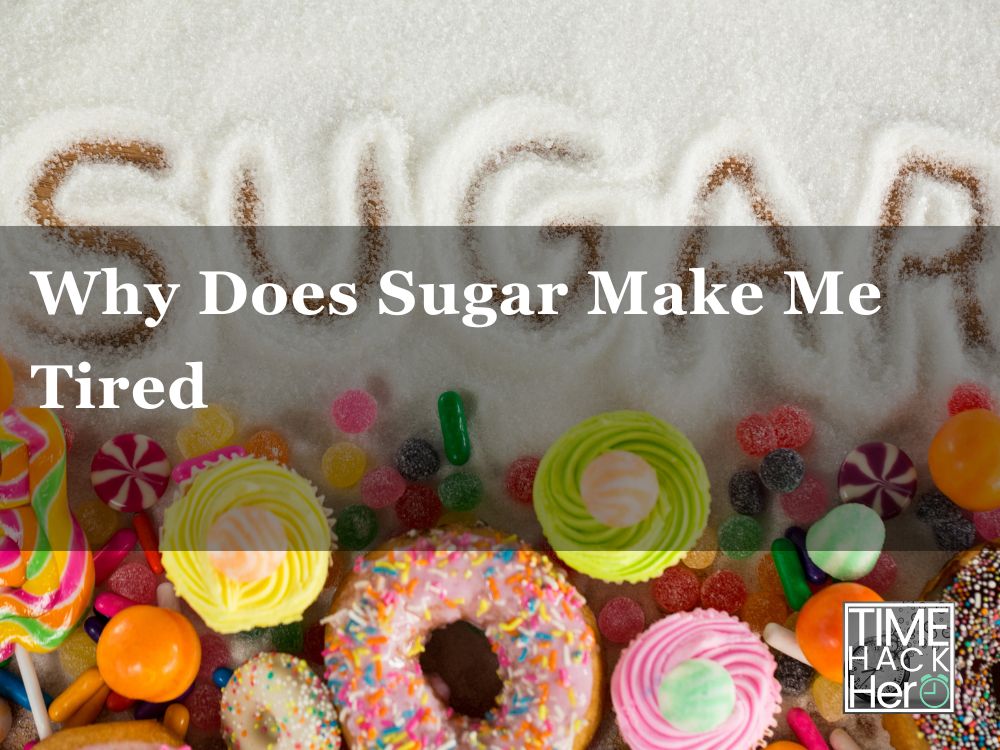It’s common knowledge that consuming too much sugar can cause an initial rush or “high” followed by a dramatic energy crash. But why exactly does this happen? And what’s going on in the body to make you feel so sluggish and drained after eating sweets?
This article will explore the normal reasons and science behind why sugar leads to fatigue for many people. It will outline the potential long-term effects chronically overdoing sugar can have on your energy levels. Finally, you’ll find helpful tips on how to fix sugar-induced tiredness through your diet and lifestyle habits.
Table of Contents
Is This Normal? Understanding Post-Sugar Fatigue
Experiencing some sleepiness and a dip in energy a couple hours after eating sugary or starchy foods is very common. In fact, there are clear physiological reasons why this blood sugar rollercoaster occurs for most people when consuming sweets or refined carbs.
Here’s a quick overview of how your body reacts after downing candy, soda, syrupy coffee drinks, doughnuts, chips, white bread, or other high sugar foods:
- Sugar enters your bloodstream rapidly, causing blood glucose to spike
- Pancreas secretes insulin to lower blood sugar
- Insulin sweep causes an abrupt drop in blood glucose
- Brain gets signal that glucose levels are too low
- Brain triggers release of hormones telling the body you need quick energy
- After initial burst, you feel fatigued as your body craves more carbs/sugar for fast energy
These interconnected hormonal and metabolic processes explain why you may experience intense sleepiness and mental fog after a sugar rush. While feeling this “sugar coma” occasionally is normal, ongoing fatigue and cravings indicate an unhealthy pattern to correct.
Common Reasons Why Sugar Causes Fatigue
Beyond the basic biochemical response outlined above, there are some specific science-backed reasons consuming too much sugar or simple carbs leaves you feeling drained soon after:
1. Spike and Crash of Blood Glucose
Eating sweets and refined carbs sends blood sugar rapidly skyrocketing. Your body responds by pumping out insulin to lower blood glucose. This plunge then leaves you feeling tired and sluggish.
2. Inflammation
Diets high in sugar promote inflammation throughout the body and brain. This taxes the immune system and research shows can impair cognition and mental energy.
3. Dehydration
Consuming sweets causes a rise in blood sugar, prompting frequent urination and loss of fluids/electrolytes vital for energy. Dehydration exacerbates fatigue.
4. Poor Sleep
Eating sugar too close to bedtime can interfere with sleep quality. Getting less deep, high-quality sleep leaves you drained during the daytime.
5. Nutrient Deficiencies
Sugar provides empty calories without beneficial nutrition. Overdoing sweets can displace nutritious whole foods and create vitamin/mineral deficiencies.
6. Blood Sugar Dysregulation
Regularly overeating sugar stresses the body’s glucose control systems, potentially worsening cellular insulin resistance over time and chronically altering energy levels.
In summary, common reasons sweets can leave you feeling sluggish include blood sugar spikes/crashes, inflammation, dehydration, poor sleep, lack of nutrients, and gradual metabolic dysfunction. Let’s next examine the longer-term impacts of excess sugar intake.
Potential Effects of Chronic Sugar Overload on Energy
While an occasional post-sugar slump is usually harmless for healthy individuals, regularly overconsuming sugar often has detrimental effects on energy levels over time including:
Physical Effects
- Obesity
- Diabetes
- Increased cardiovascular disease risk
- Fatigue/lethargy
- Cognitive impairment
Mental Effects
- Memory and concentration issues
- Depression
- Anxiety
- Addiction-like neurochemical dependency on sugar
Daily Life Effects
- Need for frequent naps
- Mood swings
- Withdrawal-type symptoms if meals are missed
- Difficulty exercising due to low energy
Work Performance Effects
- Reduced productivity and output
- Struggling to focus on tasks
- Increased errors
- Falling asleep on the job
Clearly, excessive sugar intake can negatively impact energy, mental sharpness, health, professional success, and quality of life. Minimizing added sugar is key to avoid chronically feeling drained.
Dietary Tips to Avoid Sugar Crashes
Here are some key nutrition-based strategies to maintain steady energy while minimizing blood sugar swings:
1. Eat More Protein and Healthy Fats
Protein and fats are digested more slowly than carbohydrates, releasing a gradual supply of energy.
Aim for 20-30 grams of protein per meal. Great protein sources include eggs, Greek yogurt, cottage cheese, nuts, seeds, beans, fish, poultry, meat, and protein powder.
Incorporate healthy fats like olive oil, avocados, nuts, seeds, coconut, nut butters, salmon and chia seeds.
2. Choose High-Fiber Carbs
Fiber helps slow digestion of carbohydrates to prevent blood sugar spikes.
Focus on whole grains, vegetables, fruits, and legumes. Choose whole wheat bread over white, brown rice and quinoa over white rice, steel cut oats over instant oats, sweet potatoes over white potatoes, fruits over juice, etc. The more processed the carbs, the faster they hit your bloodstream.
3. Stay Hydrated
Drinking enough water is key for steady energy. Being even mildly dehydrated causes mental fog and fatigue. Aim for eight 8-ounce glasses of water daily. Add lemon, mint or cucumber for flavor. Seltzer water is also hydrating.
4. Consume Caffeine Strategically
Caffeine provides quick energy but also results in an energy crash after a few hours. Limit coffee, tea, soda or energy drinks to 1-2 servings earlier in your day rather than relying on caffeine to power through the afternoon.
5. Eat Snacks Between Meals
Going too long without eating leads to plummeting blood sugar and cravings for quick carbs. Plan snacks like nuts, hard boiled eggs, vegetables and hummus, apple slices with nut butter or Greek yogurt to tide you over between meals.
6. Choose Low-Glycemic Index Foods
The glycemic index (GI) measures how quickly a food raises blood sugar. Choose lower GI foods like oatmeal, beans, non-starchy veggies and stone fruits over high GI foods like bagels, pretzels, juice and watermelon.
7. Increase Vinegar Consumption
Studies show small amounts of vinegar with meals slows digestion of carbs and prevents glucose spikes. Add balsamic drizzle to salads and veggies or a tsp of apple cider vinegar to water.
8. Manage Stress
Chronic stress releases glucose from your liver, causing blood sugar swings. Practicing meditation, deep breathing, yoga, walks outside and other stress management tactics helps regulate energy.
Adjusting meal composition and timing while being mindful of hunger cues and stress goes a long way towards balancing blood sugar for minimized energy crashes.
Lifestyle Changes Beyond Diet
Certain lifestyle habits also stabilize energy:
Exercise regularly – Activity makes your cells more sensitive to insulin to allow better glucose uptake. Aim for 30-60 minutes daily.
Sleep adequately – Not getting 7-9 hours of sleep distorts appetite signals and impairs glucose metabolism.
Drink alcohol moderately – Large amounts of alcohol also strain blood sugar regulation.
Supplement with anti-inflammatory herbs – Herbs like turmeric, cinnamon, ginger, garlic and fenugreek help regulate blood glucose and insulin response. Consult your doctor before supplementing heavily.
Reduce refined sugar intake – Limit desserts, candy, table sugar, syrup, soda and juice to 3-4 times weekly instead of daily.
De-stress – High cortisol from chronic stress enhances insulin resistance.
Get routine wellness checks – See your doctor to rule out potential medical causes like thyroid disorders, diabetes or polycystic ovarian syndrome.
Indicators of Serious Blood Sugar Problems
Consult your physician promptly if you experience:
- Fatigue, blurred vision, excessive thirst and frequent urination
- Unexplained weight loss
- Regular fainting episodes
- Dizziness upon standing
- Nausea, rapid heartbeat, sweating, anxiety
- Sleepiness after meals
These may indicate prediabetes or undiagnosed diabetes requiring medical attention. Catching blood sugar conditions early is vital for proper management.
Frequently Asked Questions
1. Why does eating something sweet make me sleepy right after?
Eating sweets and simple carbs causes your blood sugar to spike, prompting a rush of insulin to lower glucose quickly. This rapid rise and fall of blood sugar leads to fatigue soon after consuming sugar. Your body craves more fast carbs to bring glucose back up.
2. Is it OK to eat sugar if I feel tired and need energy?
No – sugar will provide a quick short-lived burst, but lead to a “crash” soon after which makes you feel even more sluggish than before. Choose complex carbs, protein and healthy fats for steady, sustainable energy without the blood sugar rollercoaster.
3. How long after eating sugar will I feel tired?
Most people start feeling tired and mentally foggy around 1-2 hours after consuming simple sugars or refined carbs on an empty stomach. Signs of a “sugar crash” can last up to a few hours until the body restores normal blood glucose levels.
4. Will I stop feeling tired after cutting out sugar?
Eliminating added sugar and excessive refined carbs while focusing on whole foods will promote more stable energy levels during the day. Make sure to also stay hydrated, control portions, exercise, and get enough sleep – a multifaceted approach fights fatigue best.
5. What should I eat if I’m tired in the afternoon from sugar at lunch?
If you start feeling sluggish a few hours after a high-carb lunch, have a snack with fiber and protein such as yogurt, nuts, hummus and veggies, or peanut butter on whole grain toast. This will provide sustained energy until your next meal.
Conclusion
In summary, the “crash” after consuming sweets is caused by blood sugar spikes, inflammation, dehydration, poor sleep, and nutrition issues. While occasional sugar-related fatigue is normal, chronic overconsumption can negatively impact energy levels, mood, health, and mental sharpness over time. Reducing dietary sugar, staying hydrated, getting rest, and eating balanced whole foods is key to feeling energized!









